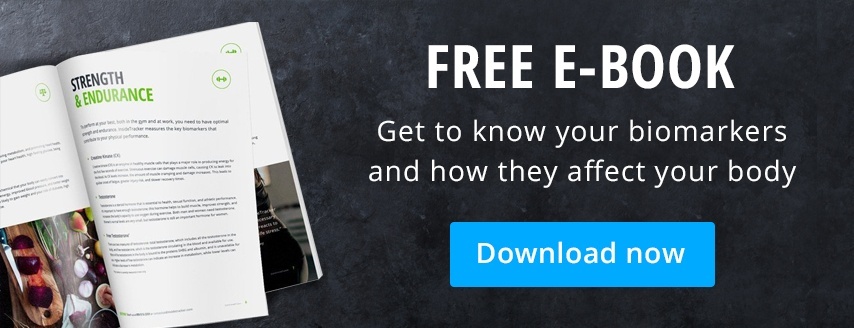![]()
Science is constantly changing. One day something can be healthy and the next day it’s not. It can certainly be frustrating, but that is why InsideTracker is here to dig through the science and present you with the most up-to-date research. Not surprisingly, one of these big swings in scientific knowledge recently happened with one of our most tested biomarkers, HDL cholesterol. It was previously thought, and still widely believed, that the more HDL cholesterol, or the often-termed “good cholesterol”, you have, the better. But recent research is showing that you can have too much of this good thing. Numerous new cohort studies are showing an unexpected association: a high level of HDL carries the same risk as having a low level of HDL-cholesterol.
What is HDL-cholesterol?
At InsideTracker, we pride ourselves on having the most up-to-date and personalized optimal reference ranges for our biomarkers. HDL is no exception. Our scientists have been poring over the literature in an effort to bring you a new optimal range for HDL-cholesterol. These new studies have prompted us to introduce an upper limit for HDL-cholesterol, to account for new associations between high HDL-cholesterol and higher disease risks. Before we dive deeper, let’s recap why HDL matters.
High-density lipoprotein cholesterol or HDL-cholesterol has been considered “good cholesterol.” HDL cholesterol acts as a scavenger, by picking up LDL cholesterol, or “bad cholesterol”, in your blood, and transporting them back to the liver to be disposed or reconfigured. The LDL cholesterol can cause blockages in your arteries, so in essence, HDL helps to keep your arteries running squeaky clean. Clean arteries allow for free blood flow, which is key to heart health. When HDL-cholesterol levels are low, the balance of good to bad cholesterol can be tilted too far. High LDL cholesterol without optimal HDL cholesterol can increase the risk of poor heart health further than high LDL cholesterol alone. Until recently, dietary interventions have aimed to increase HDL-cholesterol and decrease LDL-cholesterol in order to reach the ideal ratio for heart health.
Too much of a good thing?
The Copenhagen General Population Study, as well as other cohort studies, have yielded interesting results. HDL-cholesterol has a U-shaped effect on health. Very high and very low levels of HDL are associated with a higher risk of infectious and chronic diseases compared to the middle to high ranges.1 This cohort also demonstrated that high levels of HDL cholesterol are associated with higher all-cause mortality, which means that very high HDL cholesterol may be a risk factor for the length of life.2
Scientists are still deliberating as to why very high levels of HDL-cholesterol are no longer seemingly protective and are potentially harmful. High levels of HDL-cholesterol are relatively uncommon and, therefore, very understudied. One hypothesis for the recent prevalence of high HDL levels is the adoption of high-fat diets, such as the ketogenic diet. One of the interventions for increasing low HDL levels is increasing dietary intake of healthy unsaturated fats, such as fatty fish, nuts, or plant oils.3 Perhaps, excess intake of fat from both healthy, unsaturated sources and less healthy, saturated sources, such as animal products, is leading to the recently observed high levels.
Because clinical trials that aim to lower HDL-cholesterol have not been conducted, scientists do not have a strong theoretical basis for the association or any mechanisms that may be the cause. One speculation is that the cardioprotective properties of HDL-cholesterol depend on particle size and quality, rather than quantity.
What can we do about high HDL?
Because the idea that high levels of HDL-cholesterol can be detrimental to health is relatively new, there are few interventions that aim to decrease HDL-cholesterol levels. A few studies have shown the beneficial effect that plant-based diets (vegetarian or vegan) can have on HDL-cholesterol levels in individuals who have HDL-cholesterol that exceeds our optimal range. It is important to note that these studies only appear to reduce HDL levels when it is high, and have no effect on HDL when it is low. Individuals with low HDL levels should work to increase it.
So, how do you know if your HDL cholesterol falls within your optimal zone for overall health and longevity? Or, do you want to find out if your diet is really working for you? We all want to live longer, let us equip you with the tools to do just that. Having your blood tested with InsideTracker is quick and simple. If you already have blood work, uploading them onto our platform for analysis couldn’t be easier.
Learn how your biomarkers affect your body in this FREE e-Book download!
Some other blog posts we think you'll love:
- Get the InsideTracker Experience from Your Next Physical
- How We Define Your Optimized Zones of Health and Performance
- A Guide to Understanding How to Use Your HSA, HRA, or FSA
- How to Naturally Improve Your Digestive Health
References:
[1] Madsen, C. M., Varbo, A., Tybjærg-Hansen, A., Frikke-Schmidt, R., & Nordestgaard, B. G. (2018, April 07). U-shaped relationship of HDL and risk of infectious disease: Two prospective population-based cohort studies. Retrieved from https://www.ncbi.nlm.nih.gov/pubmed/29228167
[2] Madsen, C. M., Varbo, A., & Nordestgaard, B. G. (2017, August 21). Extreme high high-density lipoprotein cholesterol is paradoxically associated with high mortality in men and women: Two prospective cohort studies. Retrieved from https://www.ncbi.nlm.nih.gov/pubmed/28419274
[3] Hodson, L., Skeaff, C., & Chisholm, W. (2001). The effect of replacing dietary saturated fat with polyunsaturated or monounsaturated fat on plasma lipids in free-living young adults. European Journal of Clinical Nutrition,55(10), 908-915. doi:10.1038/sj.ejcn.1601234


